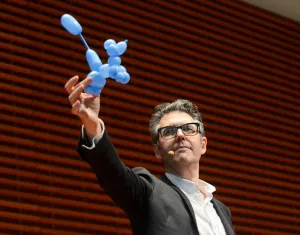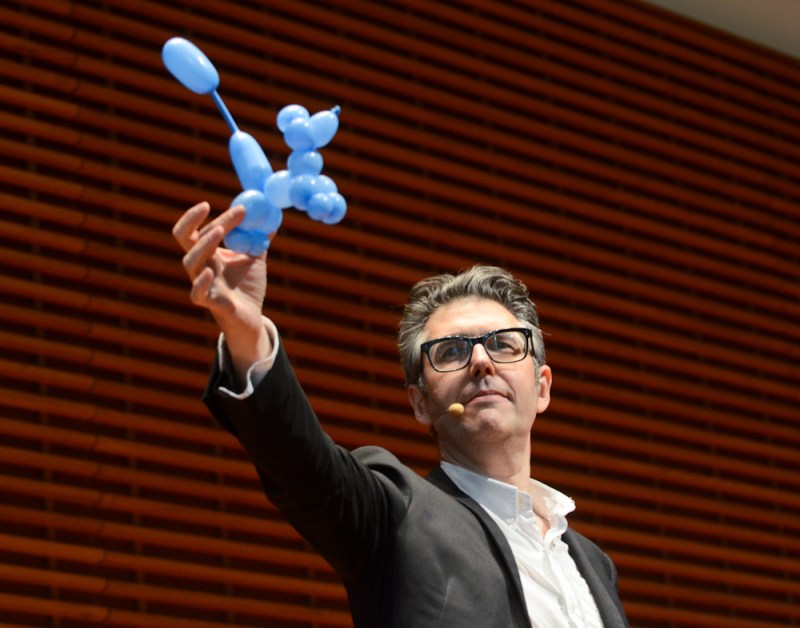“Radio is your most visual medium,” radio host Ira Glass told a full CEMEX Auditorium on Sunday afternoon. He paused for several moments as the audience remained quiet.
“That’s not actually true, but if you say it in a certain tone of voice…”

Glass is the host of “This American Life (TAL),” a critically acclaimed weekly public radio show with around 1.7 million listeners. The show uses the power of storytelling to focus listeners on the emotional moments that traditional reporting often overlooks.
Glass played various clips from different broadcast shows throughout the two-hour presentation and drew a sharp line of contrast between “mainstream” media outlets and his work at TAL.
“Mainstream broadcast journalism uses everything in its power, at all times, to convince you that what it is saying is really, really important,” Glass said, noting that TAL prefers to use the “fundamental force” of narrative rather than dramatic soundtracks and heavy-handed tone.
“When someone tells a story about themselves in a way that it’s possible to imagine being them…it just touches you. It’s a real thing, a profound thing, and its something you can give people,” he said.
While Glass said he respects the work of traditional journalists, as the presentation went on it became clear his criticisms were both incisive and encompassing.
Glass said the failure of traditional journalism to incorporate the funny with the serious was a “failure of craft,” and described how the gravitas and above-it-all nature of network news had a “weird nervousness to it.”
TAL’s shift from this style comes mainly in the narrative presentation of the show. Instead of following a traditional script of a radio program, interviewing two sides and providing a brief moment of analysis, Glass tries to make the listener feel a sense of satisfaction that only comes from hearing a great story.
“What’s that made of? What produces that? What creates that feeling?” asked Glass.
And while TAL isn’t the only program that seeks to tell stories, its success comes from its stories’ ability to consistently move and impact the emotions of listeners.
Glass described one segment, of a shark-bite victim who endured a punctured bowel with no medication, which caused several intense, physical reactions from listeners.
Listeners wrote emails, describing hearing the segment and immediately beginning to shake and in some cases black out, with one even crashing her car. Glass singled out one listener who described a similar reaction and later told him, “On the way back home I tried to listen to it again…”
“That is narrative control,” said Glass to laughter from the audience. “I’m making her physically sick, and she’s saying, ‘I need to get back [to the story].’”
Keeping true to TAL’s style, Glass mixed the serious with the funny in his presentation. Moments before playing the clip in which the shark-attack victim described feeling like she was on fire, Glass was busy making a balloon animal for an audience member. One thing Glass wanted to impart to the student members of the audience was the importance of amusing yourself in your work.
“The more you amuse yourself, the better your work will be,” he said.
Glass also teased a possible spinoff of “This American Life,” based on an episode he has already produced called “This Week.” In an interview after the presentation, Glass stressed he wasn’t sure he would actually go forward with the idea, but he is currently exploring the idea of a weekly show, in the style of TAL, that takes on current news events.
Interestingly, though he said no comparison would be perfect, Glass used John Stewart’s style of incisive news analysis as a possible model for the new show.
During the presentation, Glass told the audience of how when he was a 19-year-old intern at NPR, he would always put one thing into a segment that was just for him.
Later, an audience member asked him if he’d put one thing into Sunday’s presentation. With a smile, Glass said everything was for him now. He does the same thing he did as an NPR intern, except instead of one nugget per story, he gets an hourlong radio show.
“If it’s not touching me, then there’s no point in doing it.”
